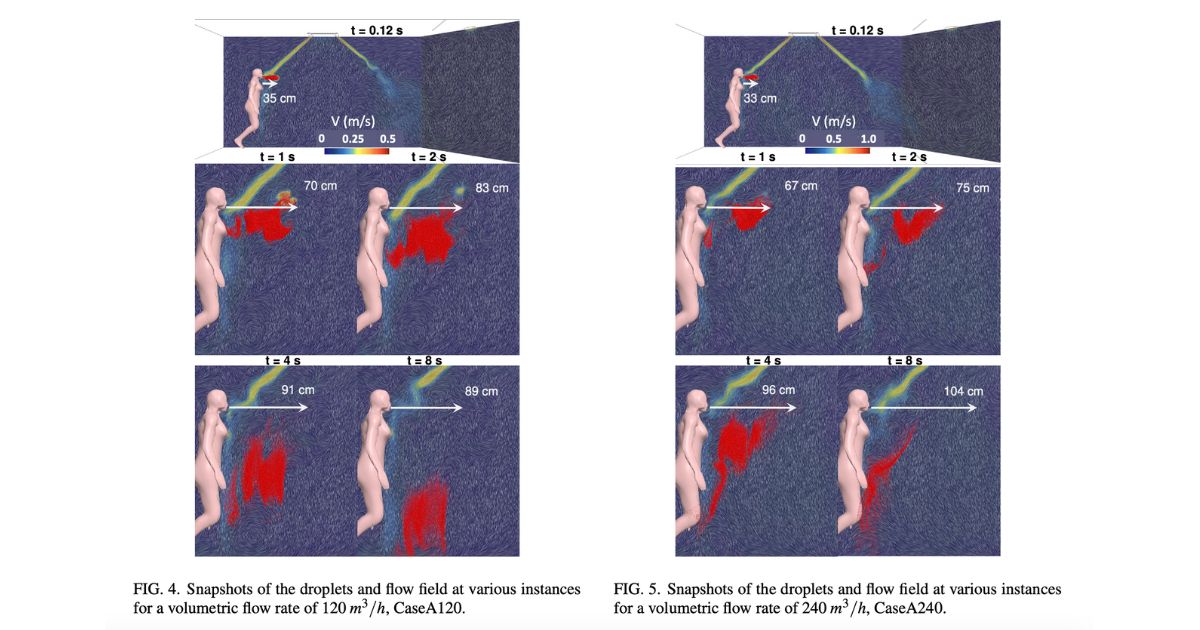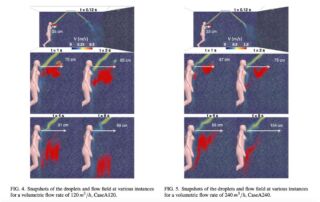Virus spreading in cruiser cabin
Professor Dimitris Drikakis, Dr Ioannis Kokkinakis and Dr Konstantinos Ritos
University of Nicosia
As COVID-19 initially swept across the world, its impact was notably profound within the realm of cruise ships. Remarkably, compared to various other groups, passengers aboard these vessels encountered a disproportionate infection rate, often finding themselves paradoxically marooned onboard for quarantine purposes. Consequently, considerable attention has been channelled towards addressing the imperative for enhanced ventilation systems on cruise ships.
This paper concerns virus droplet simulations in a typical cruiser’s cabin. Effects of ventilation rates and positions of the coughing person were investigated. The study also emphasises the importance of including evaporation models to simulate the process accurately.

Objectives of the study

What Does This Mean?
- The effective dispersion of fresh air within cabins and enclosed areas is a crucial measure in curbing the transmission of viruses.
- A higher ventilation rate is not always the best strategy to avoid the spread of airborne diseases, as saliva droplets can spread further at high ventilation rates.
- The authors propose using ventilation systems at medium flow rates of around 120 m3/h or three air changes per hour when a cabin is occupied. This value is also close to the recommended value of 108 m3/h from the latest standard by the American Society of Heating, Refrigerating and Air-Conditioning Engineers.
- The suggested value minimizes droplet spreading while maintaining good ventilation, comfort, and energy consumption.
Virus spreading in cruiser cabin featured
Read the full paperNon-Technical Summary
The paper entitled ‘Virus spreading in cruiser cabin’ concerns virus droplet simulations in a typical cruiser’s cabin. The effects of ventilation rates and positions of the coughing person were investigated.
The study also emphasizes the importance of including evaporation models to simulate the process accurately. A higher ventilation rate is not always the best strategy to avoid spreading airborne diseases, as saliva droplets can spread further at high ventilation rates.
Regardless of the ventilation strategy, they evaporate faster than the room’s air renewal. One should aim for minimum droplet spreading inside the cabin and different ventilation strategies for occupied cabins.
The authors propose using ventilation systems at medium flow rates of around 120 cubic meters per hour or 3 air changes per hour when a cabin is occupied. This value is also close to the recommended value of 108 cubic meters per hour from the latest standard by the American Society of Heating, Refrigerating and Air-Conditioning Engineers. The suggested value minimises droplet spreading while maintaining good ventilation, comfort and energy consumption.
Contact Information
For more information about this study, please contact Professor Dimitris Drikakis, UNIC Vice President for Global Partnerships and Executive Director of Research & Innovation Office, at [email protected].
Press Coverage
Articles and press mentions in global media about the research.
Blasting air conditioning for 12 minutes could prevent virus outbreaks on cruise ships – Study Finds
Blasting air conditioning for 12 minutes could prevent virus outbreaks on cruise ships NICOSIA, Cyprus — Cruise ships can steer clear of spreading illnesses like COVID and norovirus by blasting the air conditioner in cabins for 12 minutes, a new study explains. In the wake of a significant number of cruise ship passengers becoming disproportionately infected, many travelers found themselves stranded on board, subject to stringent quarantine measures. Since then, attention has shifted to the critical need for enhanced [...]
Cruise ships rethink ventilation to minimize viral spread • Earth.com
Cruise ships rethink ventilation to minimize viral spread As the COVID-19 pandemic emerged, one of the most pronounced impacts was observed on cruise ships. A disproportionate number of cruise ship passengers were infected with the virus and stranded onboard for quarantine. This scenario highlighted the urgent need for improved ventilation on cruise ships to distribute fresh air, especially in cabins and other enclosed areas, to reduce viral transmission. Airborne viruses A new study published by the American Institute of [...]
Study investigates virus spread in cruise ship cabins: More ventilation does not mean safer conditions
https://medicalxpress.com/news/2023-10-virus-cruise-ship-cabins-ventilation.html Study investigates virus spread in cruise ship cabins: More ventilation does not mean safer conditions by American Institute of Physics When COVID-19 began to spread across the globe, its effects were significantly pronounced on cruise ships. Indeed, compared to other population segments, cruise ship passengers became disproportionately infected and often, ironically, stranded on board to quarantine. That's why focus has been directed at addressing the need for improved ventilation on cruise ships— since dispersing fresh air in cabins and [...]
Best way to stop spread of viruses like Covid on cruise ships | Express.co.uk
https://www.express.co.uk/life-style/health/1829937/covid-cruise-ships-stop-spread Express. Home of the Daily and Sunday Express. Blasting the cabin on a cruise ship with air con for a certain amount of time could stop the spread of viruses such as Covid. COVID patients exhale high levels of virus the first eight days The risk of a Covid outbreak is higher when a lot of people share a common space, like on a cruise ship, as demonstrated during the pandemic. In a new study, researchers found simply [...]






